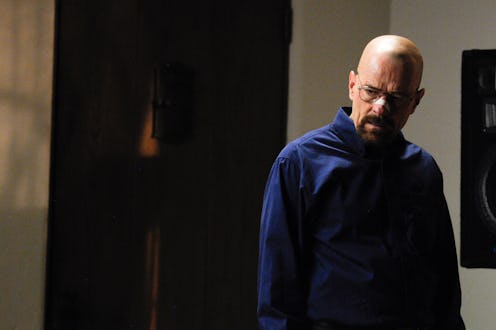Entertainment
How Great was that 'Breaking Bad' Confession?

How great was last night's episode of Breaking Bad? Between the so-called "confession" (more on that in a bit), that final, gasoline-drenched scene, and the wonderful discovery that Saul owns a Hello Kitty cellphone, the episode was the season's best — and that's saying a lot, considering that the first two episodes this summer set the bar pretty damn high.
By far, though, the best part of Sunday's episode was the confession. The hour contained many startling scenes, but none caused more jaws to drop than Walt's "admission of guilt," which turned out to be far from what any viewer expected when that video began rolling. Earlier in the episode, we see Skyler set up a camera, and then ask Walt if he definitely wanted to do it. He says that it's the only way, and then, as the tape begins, states that it's his confession. So naturally, viewers assume that Walt is planning some sort of escape, and that the confession is his way of making sure his wife and kids are protected while he evades the DEA.
Of course, we're wrong. Nothing in Breaking Bad is ever that simple. As we later find out, the tape is indeed a confession, but a fake one Walt has created in order to stop Hank from reporting him to the DEA. It's brilliant, manipulative, and totally unexpected — in other words, exactly the type of thing Walter White has perfected over the course of five and a half seasons.
The tape, in which Walt "confesses" that he was involuntarily pulled into a drug ring led by Hank, is stunning in its genius. Walt spins a long, thought-out tale, saying that Hank, not Walt, is the ruthless, murderous drug lord, and that he threatened and blackmailed Walt into using his chemistry skills to make meth. Walt works in all the details, and everything, from Gus Fring's death (Hank did it), the money for Hank's rehab (Hank made him pay), the bomb on Hector's wheelchair (Walt's creation, forced by Hank), Walt's recent black eye (Hank did it, when Walt tried to escape) is ingeniously plausible.
Every crime that Walt committed, every one of his or Hank's brushes with death, is explained away by the story, and attributed to Hank's ruthlessness. Walt is painted as a helpless victim, dragged into and unable to escape from a powerful drug ring. He even chokes up halfway through the video, looking so believably worn-down that only his family — and viewers who've watched him for five seasons — is able to tell that it's all an elaborate lie. It all makes such sense that no one would think to doubt the story's veracity, especially not the DEA.
As Hank and Marie watch the video, their expressions change from shocked to disgusted to outraged to helpless, in a transition heartbreaking in its inevitability. They know they're trapped; if the video was ever released to the DEA, Hank would be behind bars within seconds, while Walt would be a free man. There's nothing they can do except adhere to Walt's wishes. Like always, Heisenberg is one giant step ahead of everyone around him.
There is much to praise about Cranston's astounding delivery of the monologue, or Hank and Marie's complex reactions, or the staging of the scene, with the two of them standing violently still as they watched the tape, but the most affecting element of the scene was the monologue itself. It was stunningly convincing and brilliantly thought-out, and so shocking that not even the biggest Breaking Bad theorists saw it coming.
In an interview with Vulture, Gennifer Hutchison, the writer of Sunday's episode, discussed the creation of the speech, revealing that while the writers had always intended for Walt to blackmail Hank, the idea of a video "confession" came later. The actual monologue was over three pages long, and Cranston read it straight through, fully memorized. It's a hugely impressive feat by both Cranston and the Hutchison, and it will undoubtedly go down as one of the best Breaking Bad scenes of all time. Powerful, ingenious, and emotionally manipulative, the "confession" summarized everything we love about the show, and everything we love to hate about Walter White.
And the full effects of the video are yet to be seen. Right after the tape ends, we see Hank and Marie begin to process what they've seen. Hank focuses on the money aspect — he had no idea that his rehab was paid for by Walt, let alone by Walt's drug money — while Marie furthers her determination to make Walt pay for what he's done to their family. Hank doesn't believe that Walt will actually show the video to the DEA, but he also knows that nothing his brother-in-law does is predictable. What Walt will decide to do next is unknown to both his family and viewers at home; only five episodes to find out.
Image: AMC